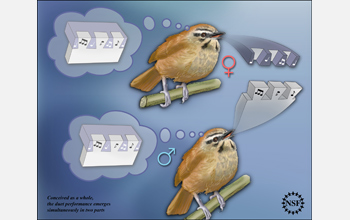News Release 11-236
Bird Song Yields a New Understanding of Cooperation
A bird duet springs forth from each bird's knowledge of the entire song

The researchers were surprised to find that the brains of both birds had a record of the full duet.
November 3, 2011
This material is available primarily for archival purposes. Telephone numbers or other contact information may be out of date; please see current contact information at media contacts.
The site of a volcano isn't the first place one might think of to study cooperation. But neuroscientist Eric Fortune of Johns Hopkins University and colleagues went to the slopes of Antisana volcano in Ecuador to study cooperation as it plays out with a very special songbird, the plain-tailed wren. Funded in part by the National Science Foundation, the researchers report their observations in the Nov. 4, 2011, issue of Science.
Rapidly alternating their singing back and forth, female and male wrens cooperate to sing a duet that sounds as if a single bird sang it. The researchers assumed that the brain of each bird would have a memory of its own part of the duet, and also have a memory of the cues from its partner. They were surprised to find that both brains had a record of the complete duet--a performance that neither bird can do by itself.
As with humans dancing a tango, one could assume that both people know their own parts of the dance and the cues from their partner, but this research suggests that both partners' brains have a powerful representation of the complete tango performance.
This simple insight from these dueting wrens is a new way to looking at cooperation. Perhaps in human endeavors it is more important to have an image of what a group wants to achieve than each participant's own tasks.
More information on this research is available in this news release from Johns Hopkins University.
-NSF-
-
The researchers' work is described in the November 4, 2011 issue of the journal Science.
Credit and Larger Version
Media Contacts
Maria C. Zacharias, NSF, (703) 292-8454, email: mzachari@nsf.gov
Lisa Ercolano, Johns Hopkins University, (443) 287 9960, email: lde@jhu.edu
Principal Investigators
Eric S. Fortune, Johns Hopkins University, (410) 516 5520, email: eric.fortune@gmail.com
The U.S. National Science Foundation propels the nation forward by advancing fundamental research in all fields of science and engineering. NSF supports research and people by providing facilities, instruments and funding to support their ingenuity and sustain the U.S. as a global leader in research and innovation. With a fiscal year 2023 budget of $9.5 billion, NSF funds reach all 50 states through grants to nearly 2,000 colleges, universities and institutions. Each year, NSF receives more than 40,000 competitive proposals and makes about 11,000 new awards. Those awards include support for cooperative research with industry, Arctic and Antarctic research and operations, and U.S. participation in international scientific efforts.
Connect with us online
NSF website: nsf.gov
NSF News: nsf.gov/news
For News Media: nsf.gov/news/newsroom
Statistics: nsf.gov/statistics/
Awards database: nsf.gov/awardsearch/
Follow us on social
Twitter: twitter.com/NSF
Facebook: facebook.com/US.NSF
Instagram: instagram.com/nsfgov

